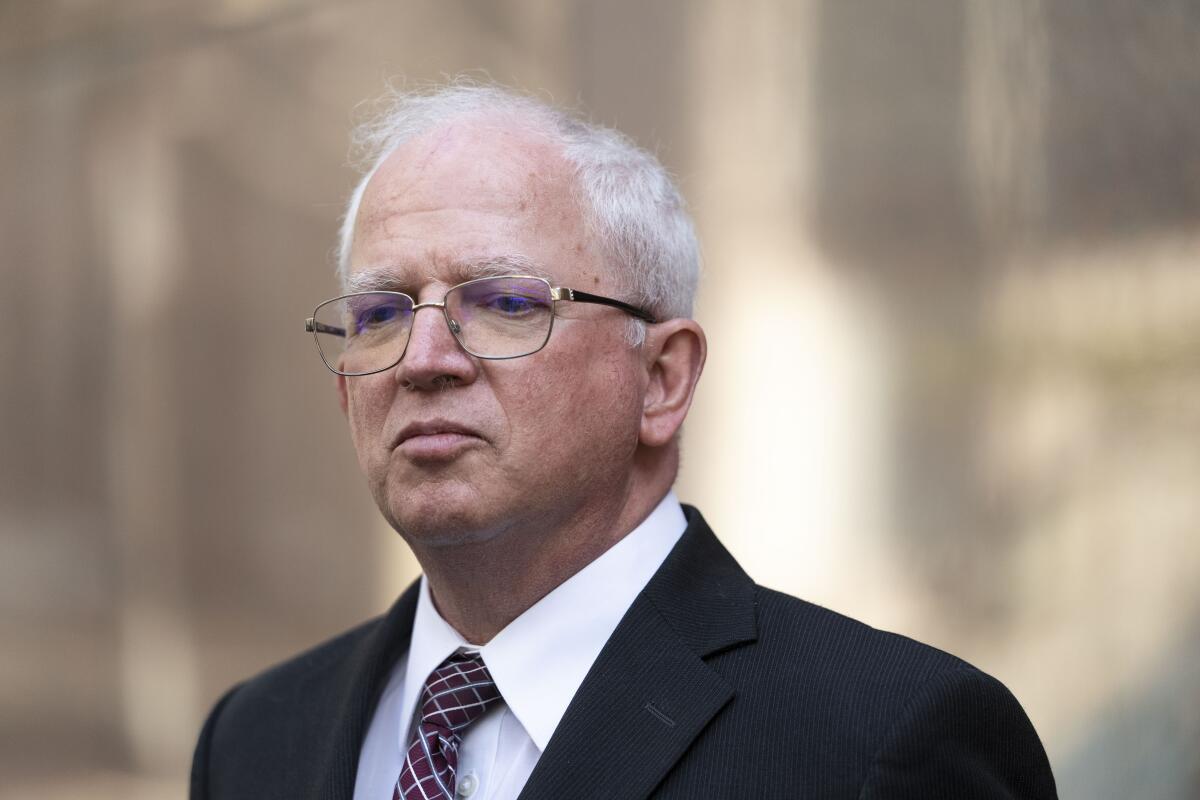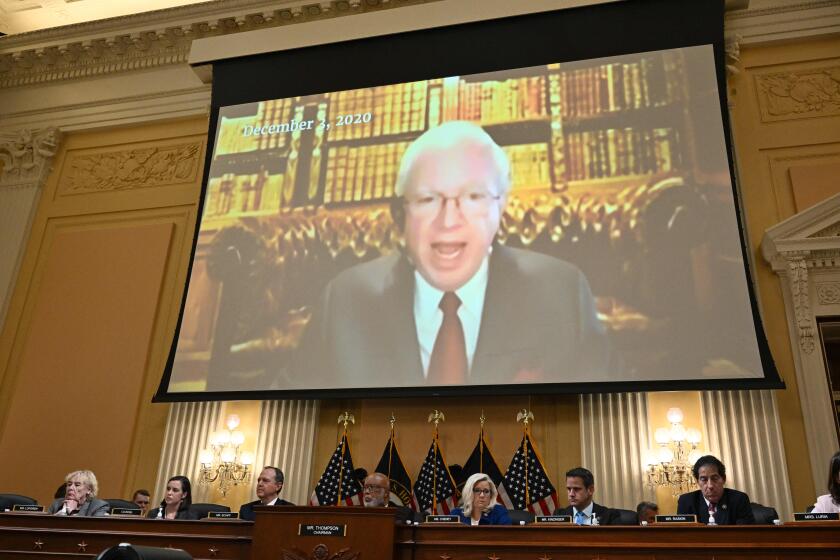John Eastman’s bar trial resumes, a week after he was indicted with Trump and others

- Share via
When John Eastman’s trial before the California Bar Court began in June, professional ruin was his gravest immediate threat. Hoping to save his law license, the former advisor to Donald Trump spent days answering questions, defiantly defending his role in the chaotic aftermath of the 2020 election.
When his trial resumes Thursday after a two-month hiatus, Eastman will enter the downtown Los Angeles courtroom a more imperiled figure. Early this month he appeared, unnamed and uncharged, as “co-conspirator 2” in the federal indictment against Trump unveiled by special counsel Jack Smith.
Then came the sprawling racketeering indictment on Aug. 14 from Fulton County, Ga., charging Eastman and 18 others — including Trump and Rudy Giuliani — with election-related schemes.
“This changed the picture quite dramatically,” Randall Miller, Eastman’s attorney, told the bar court at a hearing last week. “We’re talking about his freedom. We have to operate on all levels with extreme caution here.”
With the possibility that his words may be used against him criminally in the Georgia case, Eastman will likely invoke his 5th Amendment right against self-incrimination in the bar trial. Miller asked that the hearing be suspended “until Dr. Eastman can be out of harm’s way” in the Georgia case, adding that the indictment also scared away two of Eastman’s expected bar witnesses.
“They are very terrified,” Miller said, and as a result Eastman would be denied “a robust and muscular defense.”
The former Chapman University law school dean faces accusations of promoting false claims that electoral cheating cost former President Trump the 2020 election.
Arguing against the delay, bar attorney Duncan Carling said Eastman had made the calculated decision not to seek a delay before the trial started, even though it was obvious all along that he faced the possibility of legal trouble.
Over and over, Eastman had invoked the 5th when he appeared before the House Jan. 6 committee, which recommended that the Department of Justice consider prosecuting him. And U.S. District Judge David O. Carter had ruled that Eastman “more likely than not” broke the law in connection with the 2020 election.
“We strongly disagree that Dr. Eastman wasn’t on notice,” Carling said. “Everybody knew the these investigations were in process and that there might be indictments.”
Carling said the Georgia case, involving 19 defendants, seemed unlikely to be resolved anytime soon. “We are talking potentially years here,” Carling said.
The judge overseeing the disciplinary proceeding, Yvette Roland, ordered that it should proceed.
The State Bar, the agency that regulates lawyers, has accused Eastman of ethics violations for promoting false claims that electoral cheating put Joe Biden in the White House, and for hawking a fringe legal scheme meant to overturn the election.
On the day before rioters stormed the U.S. Capitol in 2021, Eastman peddled the theory that then-Vice President Mike Pence could unilaterally reject electoral votes in contested states where fraud was alleged, according to Pence’s former attorney, Gregory Jacob.
Pence rejected the idea as unconstitutional, and Jacob accused Eastman of serving as “a serpent in the ear of the president of the United States,” adding that it had been “gravely irresponsible for you to entice the President with an academic theory that had no legal viability.”
In the Georgia indictment, Eastman is accused of organizing 16 fake pro-Trump electors and making false statements to the Georgia Legislature, including the claim that fraudulent ballots handed Joe Biden victory in Georgia.
The indictment cites a court document Eastman filed in Fulton County on Trump’s behalf on Dec. 31, 2020, asserting that the election was marred by illegal votes from “as many as 2,506 felons,” “at least 66,247 underage” people, and “as many as 10,315 or more” dead people. Earlier that day, according to the indictment, Eastman admitted that at least some of the information in the filing was inaccurate.
Eastman’s attorney has argued that his client was just doing his duty as a vigorous advocate for then-President Trump, and was trying to ensure that “votes were properly counted,” with legal theories “advanced in good faith.”
Scott Cummings, a law professor at UCLA and an expert on legal ethics who has watched the Eastman case unfold, said the bar hearing carried monumental stakes both for the California Bar and for the legal profession.
“Unprecedented is an overused word, but it really is an unprecedented situation,” Cummings said. “I think you have to go back to Watergate to find an analog, and in many ways this is more extreme.”
John Eastman, the former Trump lawyer who helped foment the plan to invalidate the 2020 election results, left the Chapman University law faculty last year. But his legacy still sparks campus questions.
Attorneys were indicted and disbarred for misdeeds in the scandal that destroyed the Nixon administration, which involved spying on political opponents and the stealing of secrets. But the conduct “didn’t attack the rules of the game and the system itself,” Cummings said. “It wasn’t system-destructive. That’s where this feels qualitatively different.”
“This is arguably one of the most important bar disciplinary cases in history — full stop,” Cummings said. “A lawyer sworn to uphold the rule of law is charged with attacking the rule of law. … If the bar doesn’t hold him to account for that, it’s hard to understand how the system can function, going forward.”
In his defense, Eastman argues that he advanced claims about widespread election fraud — which proved baseless — with a subjective belief in their merit.
Barring unforeseen revelations that change the case, Cummings said it would set a catastrophic precedent if that argument prevailed because “every lawyer who goes before the bar disciplinary court is going to make the same argument,” adding: “Professional regulation collapses and the rule of law collapses because then everyone does that and it’s a slippery slope.”
For the California Bar, the Eastman trial also represents a bid for restored credibility after its embarrassing mishandling of the Tom Girardi case. Girardi, a famous and well-connected trial attorney, managed to avoid discipline for decades, despite a blizzard of complaints that he had been stealing from clients, while lavishing State Bar executives with gifts. His license was not taken until last year.
“This is a high-stakes case for the bar against the backdrop of failures in California regulatory enforcement that the Girardi scandal revealed,” Cummings said.
Eastman, a former clerk for Supreme Court Justice Clarence Thomas, served as the dean of Chapman‘s law school from 2007 to 2010, and remained a professor there until 2021. His bar trial is scheduled to continue, off and on, into mid-September.
More to Read
Sign up for Essential California
The most important California stories and recommendations in your inbox every morning.
You may occasionally receive promotional content from the Los Angeles Times.
















